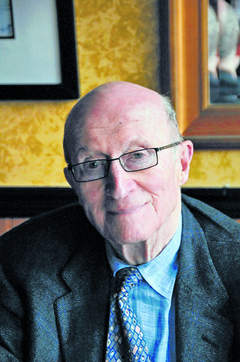Ben W. Heineman Sr. 1914-2012
 Ben W. Heineman Sr., of Chicago, died on August 5 at age 98. He was revered as a giant of his generationa brilliant lawyer, a far-sighted businessman, an adviser to presidents, governors and mayors, a prominent Chicago leader, a deeply committed supporter of opera and symphony, an influential trustee of the University of Chicago, and a world-class collector of contemporary glass.
Ben W. Heineman Sr., of Chicago, died on August 5 at age 98. He was revered as a giant of his generationa brilliant lawyer, a far-sighted businessman, an adviser to presidents, governors and mayors, a prominent Chicago leader, a deeply committed supporter of opera and symphony, an influential trustee of the University of Chicago, and a world-class collector of contemporary glass.
These and many other accomplishments reflected a person of extraordinary character, integrity and, independence, whose life truly deserved the phrases "business statesman" and "Renaissance man." He was a warm, witty, wise and caring counselor to many and, ultimately, an exemplary citizen of his city, his state, and his country.
Ben was born in Wausau, Wisconsin, on February 10, 1914, six months before the start of World War I, the son of Walter Benjamin and Elsie Brunswick Heineman. After his family lost all its money in 1929, he attended the University of Michigan from 1930 to 1933 and then Northwestern Law School, graduating in 1936 at the top of his class and as the editor of the law review. His legal career spanned the next 20 years. He was a leading corporate lawyer in Chicago.
Ben had deep friendships with the faculty at the University of Chicago law school (especially then-Dean Edward Levi, later University President). With professors and practitioners, he helped write the first version of the Uniform Commercial Code, a pillar of American law.
During World War II, he served as assistant general counsel in the Office of Price Administration and then as assistant director of the North African Economic board. In 1951, Governor Adlai E. Stevenson appointed him special assistant attorney general to investigate Illinois' cigarette tax fraud. In 1952, he worked on the Stevenson Presidential campaign, drafting the Stevenson speech sharply criticizing Sen. Joseph McCarthy.
In 1956, he was named CEO of the Chicago and Northwestern Railway after he led a successful proxy fight for dissident shareholders. He became a leading American businessman, as a dramatic innovator in a traditional industry, modernizing operating methods, reshaping labor relations, turning Chicago's commuter rail service into an acclaimed model for the nation, seeking de-regulation and greater competition. In 1968, he transformed the railway into a conglomerate, Northwest Industries, with industrial and consumer components.
In 1972, he sold the railroad to its employees who benefited from the sale. Ben retired as CEO of Northwest in 1985, at age 71, having demonstrated the controversial conglomerate form of business could succeed with strong central resource allocation and decentralized responsibility.
During his 30 years in business he also took on many governmental assignments. He served President Lyndon Johnson in numerous capacities, including chairman of the White House Conference on Civil Rights (1966); President's Task Force on Government Organization (1966-67); President's Commission on Income Maintenance Programs (1968). A "Man in the News" article in the New York Times called him "a can-do man with a conscience." He chaired the Illinois Board of Higher Education from 1962-69, developing master plans approved ultimately by the state legislature. In 1966, at the height of racial tension, Mayor Richard Daley appointed him chair of the Chicago Civil Rights Summit Conference on Fair Housing. But he turned down federal Cabinet positions and requests to run for public office, preferring to take on ad hoc assignments and retain his base as a private civic leader. He was a leading (and then life) trustee of the University of Chicago, of the Art Institute of Chicago, the Chicago Symphony Orchestra and the Chicago Lyric Opera. He also served on many other corporate and charitable boards.
The great foundation of Ben's life was his beloved wife, Natalie Goldstein Heineman, a national leader in child welfare services. They married on April 17, 1935. She died on February 28, 2010, just shy of their 75th wedding anniversary. As a couple, they exemplified civic commitment. They were also great adventurers and world travelers, e.g. sailing alone, into their early 80s, on their 62-foot sailboat along the beautiful but desolate North shore of Lake Superior.
Ben loved cars, skiing, skeet shooting, photography, woodworking, computers (he was one of the first CEOs to have a desk-top) and reading. They were deeply attached to their summer home in Door County, Wisconsin, on a 200-foot limestone cliff looking westward over Green Bay, where they often welcomed friends and family. One of their greatest adventures after Ben's retirement was assembling one of the nation's largest and finest private collections of contemporary studio glass. In 2006, Ben and Natalie gave the entire collection, valued at nearly $10 million, to the Corning Museum of Glass in Corning, New York, where all 240 objects by 87 international artists will be shown permanently on a rotating basis.
Ben is survived by his daughter, Dr. Martha Heineman Pieper (Dr. William Pieper) of Chicago and their children, Thalia Field (Jamie Jewett and son, Benjamin), Dr. Jessica Heineman-Pieper (Dr. Param Srikantia), Johanna Heineman-Pieper, and Victoria Stein (Jotham Stein and son, Gershon). He is also survived by his son, Ben W. Heineman, Jr. (Cristine Russell) of New Canaan, CT and their sons, Zachary Heineman and Matthew Heineman. There will be a private family service. In lieu of flowers, donations in the name of Ben W. Heineman Sr. can be made to The Natalie G. Heineman Smart Love Preschool, 800 W. Buena Avenue, Chicago, IL 60613 or online at www.smartlovefamily.org/contribute.php.

